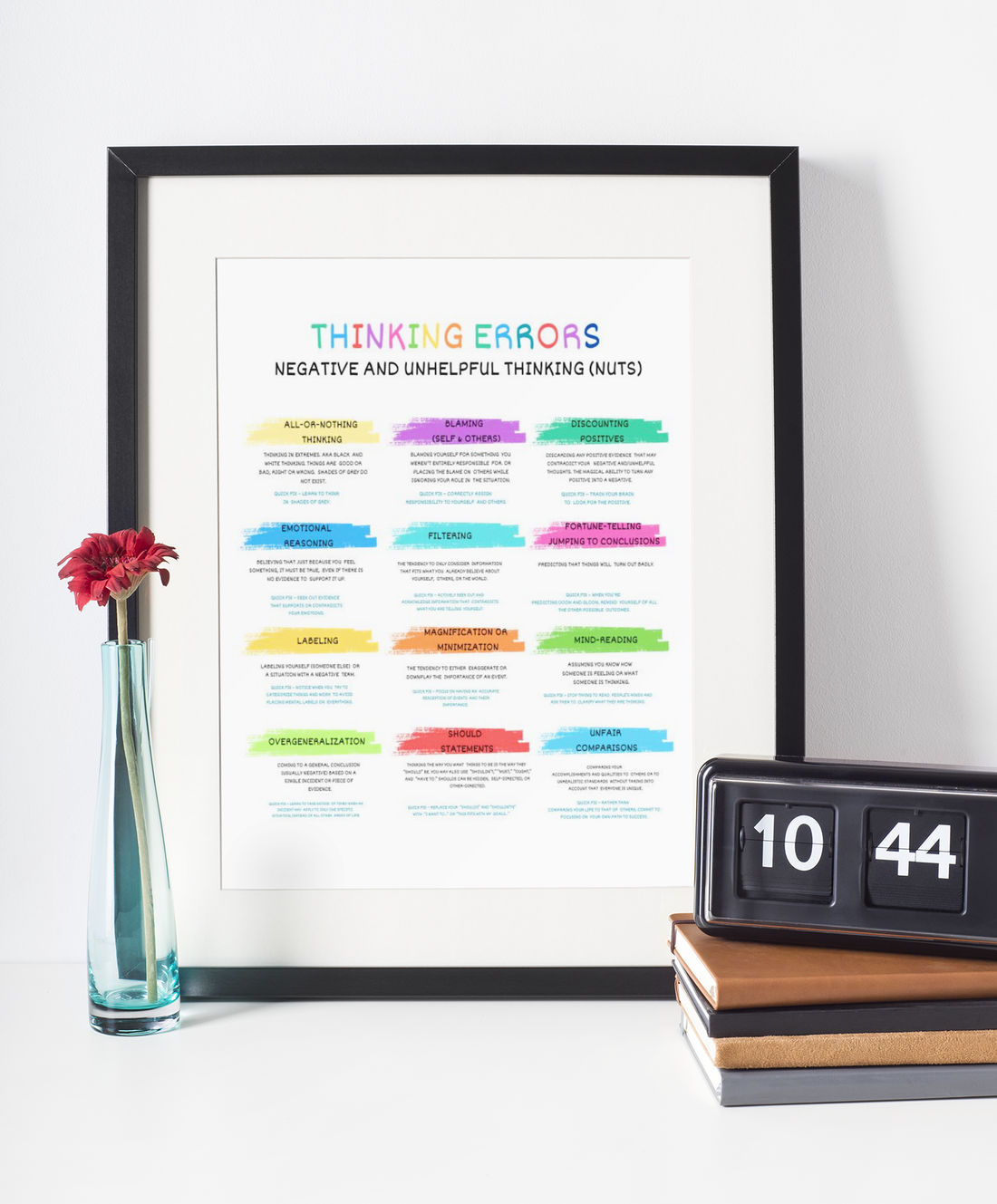

Our thoughts shape the way we perceive the world and ourselves, but sometimes our thinking can be less than helpful, negative, distorted, leading to negative emotions, unhelpful behaviors, and inaccurate judgments. When this type of thinking happen, it is known as thinking errors. These thinking errors can affect our mental health, relationships, and daily life.
In this article, I will explore some of the most common thinking errors and provide examples and strategies to help you recognize and overcome them. By understanding the ways in which our thinking can be biased or irrational, we can improve our decision-making, problem-solving, and overall well-being.

What are Thinking Errors?
Thinking errors are more also known as thinking errors (Aaron T. Beck); Cognitive Distortions (David Burns) and Automatic Negative Thoughts-ANTS (Daniel G. Amen). However, I started calling them negative or unhelpful thoughts or (NUTs) after working with several client who did not like the idea of changing their negative thoughts because the thoughts were true. Once I helped many client realized that even when a thought was true, if it did not help move them towards their goal, they should think about something else, many client became unstuck. I also like the idea of calling them NUTs, because these thoughts will drive you NUTs if you let them stay in your mind too long.
I do not think it matters too much what you call them, as long as you learn to recognize these negative thought patterns.
With all the extreme thinking that cognitive distortions can bring about, they are frequently the start of a negative "loop" that can send you spiraling deeper and deeper into depression until it seems as though there is no way out. This explains why people who experience low moods, anxiety, and low self-esteem frequently engage in distorted thinking. How does this 'loop' appear? A thought influences your emotions and physical sensations, which in turn influence your behavior. Your subsequent thought is then brought on by your behavior, which restarts the cycle cycle.
Common Thinking Errors
Below are 12 of the most common thinking errors. Each thinking error is followed by an example, explanation of why it is unhelpful thinking and a quick fix for each thinking error. Pin It1. All-or-Nothing Thinking.
Pin It1. All-or-Nothing Thinking.
Occurs when you look at things in absolute, black-and-white categories with no shades of grey. Things are either right or wrong.
Example: A person who engages in all-or-nothing thinking might say things like:
"I either aced the test or I totally failed."
"If I'm not perfect at my job, then I'm a complete failure."
"Either you're with me or you're against me."
"I'll never be able to learn how to do this."
Explanation: These statements show a lack of recognition that there can be a range of outcomes or possibilities between success and failure, or that people can have both positive and negative qualities.
Quick Fix: In order to overcome this thinking error, you have to learn to question your thoughts (i.e., "are there shades of grey I am not seeing"). By recognizing and challenging this cognitive distortion, individuals can develop a more balanced and nuanced perspective on themselves and their circumstances.
2. Overgeneralization.
This type of negative thinking happens when you look at a single, unpleasant occurrence and decide that this event represents a general, never-ending pattern of defeat.
Example: A stay-at home mother, decided to turn her hobby of painting into a business. After painting several pictures, she shows them to her friend for feedback. Her friend does not like any of the pictures. The stay-at-home, mother concludes she will never sale any paintings.
Explanation: It is illogical to conclude that something that happened to you once will happen again and again. It is also incorrect to assume that all situations are the same, or that all people are the same. Just because one person did not like the paintings, it does not mean no one will like them. Maybe the friend just prefers a different style of paintings. Or maybe the friend has no idea how to judge a good painting from a bad painting, but instead of admitting his lack of knowledge, he just says he does not like the painting.
Quick Fix: To fix overgeneralisation thinking, learn to take notice of times when an incident may apply to only one specific situation, instead of all other areas of life.
3. Mental filter.
You only consider information that fits what you already believe about yourself, others, or the world. Filtering can be particularly problematic when it leads to a self-fulfilling prophecy, in which the person only perceives negative outcomes and fails to recognize opportunities for growth and improvement.
Example: You decide to start preparing for the next day the night before. As a result, you decided to wake up at 9am to prepare for a phone conference all you have at noon. However, the next morning you over slept till 10:30 am. After jumping out of bed, you tell yourself you wasted the day.
Explanation: While it is true that over sleeping is usually a bad thing, the day is not wasted. This person is also likely overlooking many good things that happened (i.e., you like still have time to prepare for the call, you are starting to organize your life better).
Quick Fix: In order to fix mental filtering errors, you have to to actively seek out and acknowledge positive aspects of a situation or experience, to challenge negative self-talk and biases.
4. Discounting Positives.
You discard any positive evidence that may contradict your negative and/unhelpful thoughts.
Example: You scored above average on the math and reading section of the SAT and average on the writing section. Reading over your results, you tell yourself you blew the SATs.
Explanation-Discounting the positives takes the joy out of life and makes you feel inadequate. While I’m sure it would be nice to score above average on every part of the SAT, that fact that you scored above average on two sections is great.
Quick Fix: In order to fix disqualifying the positive errors, training your brain to look for the positive in each situation.
5. Jumping to Conclusions.
You jump to conclusions not warranted by the facts. There are two types of jumping to conclusions: mind reading and fortune telling.
Mind-Reading. You assume that people are reacting negatively to you.
Example: Your significant other forgot your anniversary. You tell yourself that “If he cared about you, he would remember your anniversary.”
Explanation- You are automatically assuming that a lack of caring is why your significant other forgot your anniversary. Other than “he may not care,” there could be a ton of other reason why he forgot your anniversary. Can you think of any?

6. Fortune-Telling.
You predict that things will turn out badly.
Example: You are feeling nervous about an upcoming job interview. You start telling yourself, “I know I am going to blow this interview.”
Explanation- You are predicting something bad will happen. You would be better off telling yourself it is natural to feel nervous before a job interview and reminding yourself of all the successful job interviews you had in the past. If it is your first interview, developing a plan to prepare would help as well.
Quick Fix: When you are predicting doom and gloom, whether through jumping to conclusions or fortune-telling, remind yourself of all the other possible outcomes. When I engage in fortune telling, I like to challenge myself to come up with two positive outcomes for every negative outcome.
7. Magnification or Minimization.
Your mind magnifies the awfulness of unpleasant events and minimizes the value and importance of anything positive.
Example: A college student is studying pre-medicine. He has an A average in the class but then receives a low score on a quiz, and assumes he is going to fail the class, and should no longer aspire to be a doctor.
Explanation- Rarely does one event determine a rule. Therefore, it is important to recognize that just because something awful happened once, it does not mean something awful will always happen. In addition, when important or good things happen, it is important to recognize them as such.
Quick Fix: Focus on having an accurate perception of events and their importance is crucial when attempting to fix magnification or minimization thinking errors. Ask yourself if the significance attributed to the event aligns with its actual impact. By consciously striving for an accurate perception, we can mitigate the impact of these thinking errors and make more informed and balanced judgments.
8. Emotional Reasoning.
You treat feelings as facts. “I feel like an idiot, so I must be one.” Or "I feel hopeless. This means I'll never get better."
Example: After working an 80, your coworker, who has been sober for 8 weeks, stops by the local bar because he is thinking to himself “Life is so boring, I deserve to have a little fun.”
Explanation: While your coworker may feel bored, that does not mean life is boring. In general, one cannot assume that one’s emotions are a reflection of the true state of things. Remember our emotions are a reflection of our thoughts and behavior. Emotions may also be a reflection of our physiology and how tired we are, but they are not necessarily a reflection of the true state of affairs.
Quick Fix: In order to overcome emotional reasoning, start by recognize that emotions, just like our thoughts, aren't always based on the facts. In addition, seek out evidence that supports or contradicts your emotions.
9. Should Statements.
You criticize yourself or other people with “shoulds,” “shouldn'ts,” “musts,” “oughts,” and “have tos.”
Self-Directed Shoulds lead to feelings of guilt and inferiority.
Example: “I shouldn’t be so angry. What’s wrong with me?”
Other-Directed Shoulds lead to feelings of bitterness, anger and frustration.
Example: “He shouldn’t be mad at me. I was just trying to express my feelings.”
Hidden Shoulds are rules and should statements that are implied by your negative thoughts.
Example: “How can she be so cold” has the hidden should of “she shouldn’t be so cold.”
Explanation In general, should statements sound moralistic and controlling. While many thinks should statements will motivate behavior, they usually don’t. In addition, people often come to resent the source of the “should.”
Quick Fix: Replace your “shoulds” and “shouldn’ts” with “I want to...” or “This fits with my goals...”
10. Labeling.
Instead of saying, “I made a mistake,” you tell yourself, “I'm a jerk” or “I'm a loser”
Example: While preparing for an important presentation at work, you being to tell yourself “I’ll probably make a fool of myself.”
Explanation We are not our behavior. Labeling yourself is not only self-defeating, it is irrational. You cannot be equated with any one thing you do. Your life is made up of many events, thoughts, actions, and emotions.
Quick Fix: Notice when you try to categorize things and work to avoid placing mental labels on everything
11. Self-Blame and Other-Blame.
You find fault instead of solving the problem.
Self-Blame. You blame yourself for something you weren't entirely responsible for.
Example: Your son does not make the basketball team. You think “I’m sure it’s because I didn’t practice enough with him.”
Other-Blame. You blame others and overlook ways you contributed to the problem.
Example: An abusive husband, blames his wife frustrating him.
Explanation Essentially, the person with this problem has confused influence with control. While we obviously have some influence over people, especially our children, we cannot control everything they do. What another individual does is ultimately their responsibility and decision, not yours. We are not omnipotent. Furthermore, they have identified a single event or experience as defining who they are.
Quick Fix: Take responsibility when you need to and allow others to do the same.
12. Unfair comparison
Unfairly comparing our achievements and qualities to others’ achievements and qualities without considering the reasons we each have our own strengths and weaknesses.
Example: “There are plenty of men my age who are CEOs, or have multiple houses, and can more than provide for his family, I can’t even afford to buy my own home in Philly.”
Explanation: Here, this person is measuring himself to others without considering or recognizing why these differences exist. There are many valid reasons why the other men he is comparing himself to have reached such success. There are also many valid reasons why this individual has not be able to reach such success yet, (from emotional obstacles over the year, learning disabilities, lack of resources compared to others, etc.) We all have our own strengths and weaknesses in life, that’s what makes us unique from one another, and that’s why it’s an unfair comparison to measure ourselves based on where others are in their lives.
Quick Fix: Rather than measuring your life against someone else's, commit to focusing on your own path to success. Purchase Now
Purchase Now
You can purchase a PDF summary of the above thinking errors for 2.99 here:
What Causes Thinking Errors
Thinking errors can be caused by a variety of factors. Here are some common causes of thinking errors:
Past experiences: Our past experiences can shape our thoughts and beliefs, and if we have experienced negative events, we may develop negative thought patterns that can lead to cognitive distortions.
Cultural and societal influences: Cultural and societal values and beliefs can shape the way we think and perceive the world, and can lead to cognitive biases.
Emotional states: Our emotional state can influence the way we think and perceive things. When we are feeling anxious or depressed, for example, we may be more likely to engage in negative or distorted thinking.
Lack of information: When we don't have enough information about a situation or event, we may fill in the gaps with assumptions or beliefs that may not be accurate.
Cognitive processes: Our brains are wired to take shortcuts and make quick judgments based on limited information. While this can be helpful in some situations, it can also lead to cognitive biases and errors.
Socialization and upbringing: Our upbringing and socialization can influence the way we think and perceive things. If we were raised in an environment where perfection was expected, for example, we may be more prone to all-or-nothing thinking.
It's important to recognize that thinking errors are a natural part of the human experience, and everyone engages in them to some extent. However, it is also important to realize, that engages in cognitive distortions to frequently can lead to a negative "loop" that can cause someone to spiral deeper and deeper into depression until it seems as though there is no way out.
In addition, cognitive distortions can lead to other mental health problems including anxiety symptoms, low self-esteem, lack of motivation and problematic relationships because your thoughts influences your emotions and physical sensations, which in turn influence your behavior. Your subsequent thought is then brought on by your behavior, which restarts the cycle cycle (see diagram below). However, by becoming more aware of our own cognitive biases and actively challenging them, we can develop a more balanced and accurate view of ourselves and the world around us, feel better and engage in behavior that helps us meet our goals.
Final Thoughts on Thinking Errors
The first step to change cognitive distortions, or unhealthy thinking, is to identify what we tell ourselves. No one is immune from negative thinking, as we are human, but we can challenge unhealthy thinking by examining the evidence and disarming it with biblical truth (2 Corinthians 10:4-5). If you are interested in learning additional ways to change your thinking, you can see our post here: and here. In addition, seeking help from a Christian cognitive behavioural therapists maybe beneficial. You can search out directory of therapists to find a Christian therapists near you here: Local Christian Counselors
Before you leave, we would appreciate it if you helped us spread the word by sharing, tweeting, pinning, etc. this post.
About the Author:
 Corine Williams, Ph.D. is Clinical Psychologist that is currently seeing clients in the States of Maryland, New Jersey, and New York. You can find out more about her practice by visiting www.therapyforchristians.com/corinewilliams. In addition to providing individual therapy, Dr. Williams is also passionate about writing books and designing merchandise that educate, uplift, and normalize mental health subject in the Christian community. You can find out more about her at www.booksbycorine.com or by visiting her amazon profile here: https://www.amazon.com/Corine-Hyman/e/B00AWZ5FL2
Corine Williams, Ph.D. is Clinical Psychologist that is currently seeing clients in the States of Maryland, New Jersey, and New York. You can find out more about her practice by visiting www.therapyforchristians.com/corinewilliams. In addition to providing individual therapy, Dr. Williams is also passionate about writing books and designing merchandise that educate, uplift, and normalize mental health subject in the Christian community. You can find out more about her at www.booksbycorine.com or by visiting her amazon profile here: https://www.amazon.com/Corine-Hyman/e/B00AWZ5FL2
Help us increase mental health awareness in the Christian community by donating through our paypal link here: www.paypal.com/therapyforchristians, joining our mailing list by clicking below, or join our provider list here: Provider listing
Disclaimer: the information, including but not limited to, text, graphics, images and other material contained on this article are for informational purposes only. No material on this site is intended to be a substitute for professional medical advice, diagnosis or treatment. If you are looking for a Christian counselor near you, please check out our directory located here: Christians Therapist Near Me
Featured Christian Therapists
Specialty Christian Mental Health Providers Located in Pearland, TX
View Listing.png)













